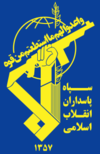Taregh-class speedboat

| |
| Class overview | |
|---|---|
| Builders | Boghammar Marin AB (original) |
| Operators | |
| In service | 1985–present |
| Completed | 1984–1985 (first batch) |
| General characteristics | |
| Type | Fast patrol boat |
| Displacement | 7 tons full load |
| Length | 13 m (42 ft 8 in) |
| Beam | 2.7 m (8 ft 10 in) |
| Draught | 0.7 m (2 ft 4 in) |
| Installed power | Diesel |
| Propulsion |
|
| Speed | 46 knots (85 km/h) |
| Range | 500 nmi (930 km) at 46 kn (85 km/h) |
| Complement | 6 (estimate) |
| Sensors and processing systems | Surface search radar, I-band |
| Armament |
|
The Taregh (Persian: طارق) is a class of fast patrol boat used by naval forces of Iran.[1]
A Boghammar is a High Speed Patrol Boat for use in coastal patrol. The term Boghammar originated from the Iranian patrol boats manufactured by the Swedish company Boghammar Marin AB during the 1980s used in the Iran–Iraq War and its Tanker War.[2]
History
[edit]In 1983, Iran purchased 50 RL-118 and RL-130 patrol crafts from Boghammar Marin AB for reportedly $10 million.[3][4] It was the biggest order ever for the shipyard, and was worth almost three times their annual revenues.[4] By February 1987, The Washington Post reported that the newly established Navy of the Islamic Revolutionary Guard Corps began using the boats.[5]
According to Svenska Dagbladet, American authorities maintained that Iran acquired at least a further 13 boats by way of Czechoslovakia.[3]
Wider use
[edit]The term boghammar, sometimes spelled boghammer, has also come to mean an improvised naval fighting vessel, typically used by a local irregular military force and usually being a modified civilian boat or other similar machine. It is usually a speedboat or fast patrol boat (as used by police for harbor/river patrol) on which are mounted recoilless rifles, heavy machine guns, mortars, or other relatively small weapons systems. A boghammar is usually unarmoured.[6]
Boghammars, in this sense, have been used by paramilitary forces to attack offshore oil platforms and civilian shipping, or even larger military vessels, most notably by Iran in the Tanker War.[2] Other users of such vessels include Nigerian militants, LTTE Sea Tigers, and Somali pirates.[6]
References
[edit]- ^ Haghshenass, Fariborz (September 2008), Iran's Asymmetric Naval Warfare (PDF) (Policy Focus), Washington Institute for Near East Policy, p. 12, archived from the original (PDF) on 2019-04-17, retrieved 2020-08-03
- ^ a b "Iran's fast attack craft fleet: behind the hyperbole". www.naval-technology.com. Kable Intelligence Limited. Retrieved 11 December 2015.
- ^ a b Taylor, Mike (14 March 1988), "Sweden Probes Claims on Sales of Boats to Iran", JOC, archived from the original on 27 August 2020, retrieved 11 July 2020
- ^ a b Soderlind, Rolf (9 August 1987), "Swedish speedboats spearhead Iranian naval warfare", United Press International, retrieved 11 July 2020
- ^ Ottaway, David B. (26 July 1987), "New Iranian Naval Weapon: High-speed Boats", The Washington Post, retrieved 11 July 2020
- ^ a b Ottolenghi, Emanuele (2010). "Iran's deceptive practices". Iran: The Looming Crisis: Can the West live with Iran's nuclear threat?. Profile Books. ISBN 978-1847654571.
- Saunders, Stephen; Philpott, Tom, eds. (2015), "Iran", IHS Jane's Fighting Ships 2015–2016, Jane's Fighting Ships (116th Revised ed.), Coulsdon: IHS Jane's, p. 390, ISBN 9780710631435, OCLC 919022075

